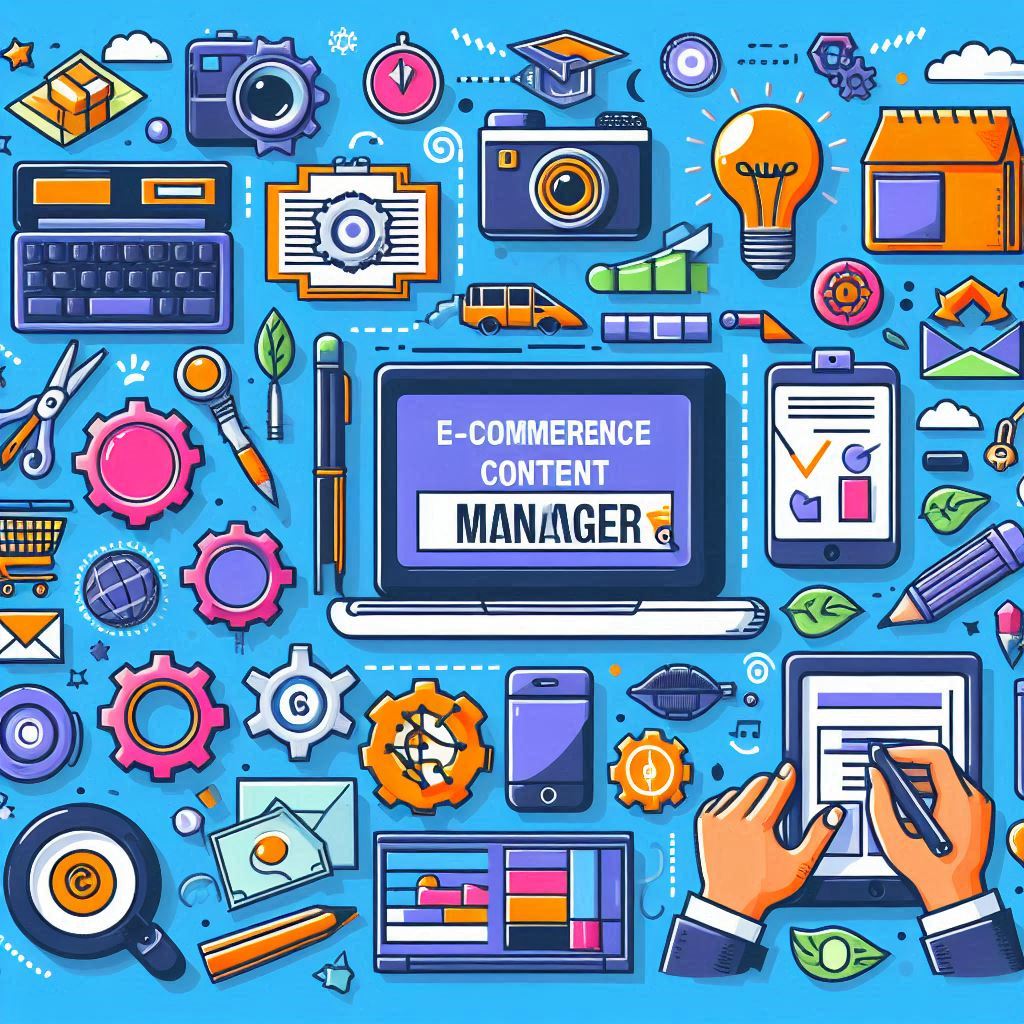Content is King in the speedy world of e-commerce Online stores run on the engine, and it has a massive impact from search engine rankings all the way down to customer engagement rates and conversion. At the center of this content-driven approach, simply put, is an E-commerce Content Manager: a person who makes sure every piece of content not only reflects from brand goals but also synchronizes chatting to target audience demands. This post will focus on the E-commerce Content Manager and their key roles, responsibilities, skills, as well as how they contribute to the success of online businesses.
What is E-commerce Content Manager?
An E-commerce Content Manager is responsible for the production, administration and optimization of content on an ecommerce platform. This is a role that includes content strategy as a whole, rather than just writing product descriptions or blog posts — so it requires thinking about how various types of media can best serve the user experience in order to increase traffic and sales. IL: In this age of digital content and the rise in e-commerce, are we likely to see any new titles evolve on daily basis or that will change as need be due to trends, SEO protocols & reader insights?

Responsibilities of an E-commerce Content Manager
Content Managers of e-commerce do several tasks, and the duty does not stay plain one day after another. The following are some of the critical functions they perform:
Content Strategy Building: They develop a complete content strategy that supports the marketing and sales goals of your brand. This involves strategies on what type of content to create, when and for which audience segments.
Product Listings and Descriptions : Writing optimized product titles, specifications, descriptions etc — resulting in an informed shopping experience for the user.
SEO Optimization: Your job will be to make sure all our content is optimized for search engines, allowing it to get found easier. Some examples of these are keyword research, on-page optimization, and tracking the performance with analytics.
Content Calendars: Producing content is one of those acts that requires meticulous organization and planning to actually get it done. Content managers create content calendars and idea boards to make sure all publishing is consistent across channels, on time (definite dates are achieved)
Working with Cross-Functional Teams: They collaborate closely with marketing, design, product development and customer service teams to confirm that content is cohesive, accurate and fits the overall brand messaging.
Must Have skills for an E-commerce Content Manager
The E-commerce Content Manager requires a creative blend of technical and analytical skill to get the job done effectively:
Content Creation and Copywriting: The ability to write well will let you create compelling narratives when required as well. It seems like almost a millennia to read through product descriptions which includes blogs, guides, emails and all the ways we communicate on social media.
SEO ( Search Engine Optimization ) & Digital Marketing : If you want to drive organic traffic and improve search visibility, make sure the candidate has a solid understanding of SEO principles as well as some basic digital marketing tactics.
Quantitative and Qualitative Data Analysis: Content Managers in e-commerce verticals need to be versatile with data readouts that will help them evaluate their content strategies, analyze what works for the audience effectively and push decision-making based on solid numbers.
Project Management – Education projects: Excellent organizational skills with experience managing multiple rural development or education project work streams. Reporting by: result for any query further assistance, you can write in to [email protected]
E-commerce Platforms: If you have prior knowledge of any e-commerce platforms like Shopify, Magento or WooCommerce it would be an added advantage as content managers usually need to publish and optimize contents on these systems.

Why SEO is Important in E-commerce Content Management
The role of SEO is crucial for the success of content in an e-commerce site. It is used to increase the rank of products in search results, which boosts traffic and helps sales. For content managers, it is important to get a grip on what separates True from False when it comes to the two most popular terms: On-page SEO (content optimization) and off-Page SEO (Building links & authority). Using SEO best practices in their content strategy helps E-commerce Content Managers to make sure that their products rank at the top of the search results, beating out competitors.
E-commerce Content Manager Tools and Technology
E-commerce Content Managers use a mix of essential tools in order to manage and optimize content responsibly.
Content Management Systems (CMS): WordPress, Shopify and Magento are only a few platforms that allow you to streamline content management.
Google Analytics, SEMrush — with help of these analytics platforms we can track how your content is doing and optimize where it may not be delivering results.
SEO Tools: To better understand which searches are being performed by your customers, competitor analysis or to optimize the basic on-page elements of a webpage such as title tags and meta descriptions; Google analytics can provide you invaluable data.
Project Management Tools: Trello / Asana, Slack are great for the planning of content projects as well (especially if you have a distributed team)
With that said, here are some of the best practices in e-commerce content management.
Here best practices are laid out that E-commerce Content Managers should keep in mind for their content strategies to be effective:
Content Audits: Keep content relevant, accurate and optimized for SEO by reviewing and regularly updating it.
A/B Testing — by experimenting with different iterations of content, you can find out what works best for your audience and consequently make any necessary tweaks. For example
One other kind of personalization is content-based on the specific audience segment which can improve engagement and conversion rates.

Problems Content Managers of an E-commerce face
E-commerce content can be cumbersome to handle. Three Questions Content Managers Hate to…
Trend watching: The media landscape is changing at the speed of light, and content managers need to keep up with SEO trends, marketing schemes or behavior patterns.
The most common misguided piece of advice people give is that you need to create a lot content but, contrary to popular belief this saying doesn’t talk about quality which in fact should be the highest when comes building trust and conversions.
Dealing with Multichannel Content Distribution: It is extremely necessary to strategize and maintain content across various platforms from websites, social media sites or email efforts.
How E-commerce Content Affects the Customer Experience
The last thing I would want to tell you is that content matters in the customer journey. Good content informs our customers, making smart consumers of them, decreasing bounce rates and more likely creating repeat business. Offering information and insights, as well as answering basic questions to customers is a pivotal part of building up a customer relationship that leads towards trust in an E-Commerce Content Manager.

The E-Commerce Content Managers Life and Career Roadmap
There is high demand for skilled professionals in the job market and they can easily get promoted to higher positions. Content Coordinator/Copywriter -> Content Strategist/E-commerce Manager/Head of Digital Marketing Content management skills can also reasonably translate to other positions in digital marketing and ecommerce.
Conclusion
The role of an E-commerce Content Manager is key to the success of online business as you create and manage content that attracts, converts and retains customers. And proficiency in those three fields can dramatically shape a brand’s domains and user satisfaction. Content managers will be even more crucial as e-commerce continues to expand, so it is definitely an interesting career option.
FAQs
What does an E-commerce Content Manager do and what qualifications are needed?
You will often need a bachelor’s degree in either marketing, communications, journalism or some related field. Content creation, SEO experience and knowledge (and e-commerce platforms is a plus)
What changes in content management between B2B and B2C e-commerce?
Content that is B2B related typically revolves around product specs in more detail, whitepapers and case studies while content of a B2C nature may be promotional or based on customer experience/engagement.
Average salary of an E-commerce Content Manager?
E-commerce Content Manager — Salaries range depending on location, experience as well as company size and a that the average salary for an E-commerce content manager can expect to earn over $50K–80k/year.
Measure success as an E-commerce Content Manager?
It is evaluated by Key Performance Indicators (KPIs) like organic traffic, conversion rates, bounce rate and other metrics of customer engagement.
What are the most notorious problems in e-commerce content management today?
Some of the main challenges for E-commerce Content Managers today include keeping up with changes in SEO, managing content through multiple channels and balancing quality vs. volume- something we are about to address right now.

Pingback: Marketing Your Law Firm in 2024: The Best Guide to Grow Your Practice - engageeureka.com